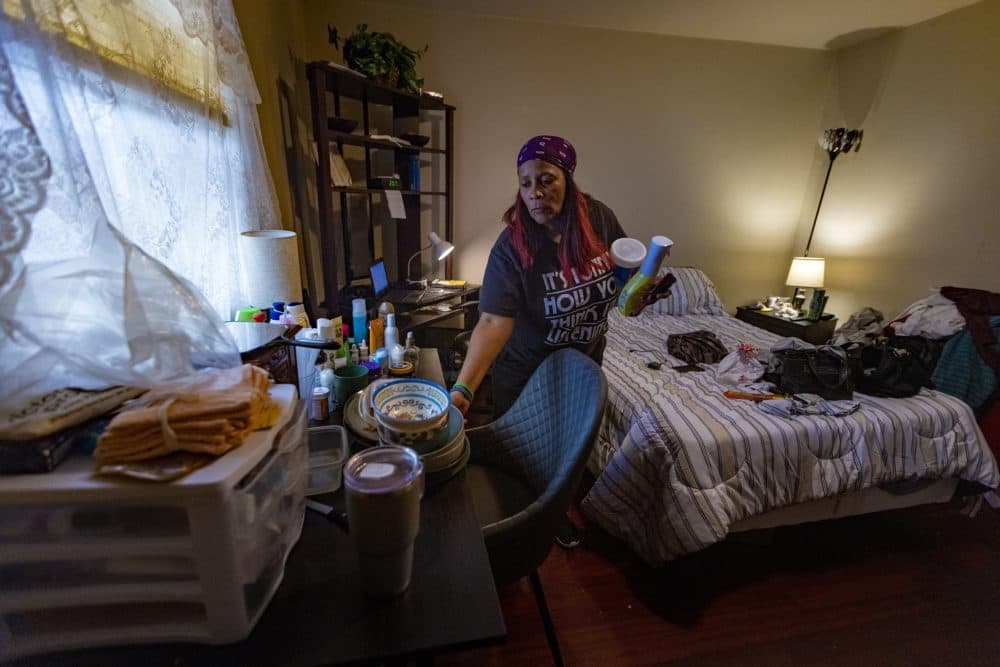Advertisement
Hotel-based homeless shelters changed lives in pandemic. Some want them to be a model moving forward
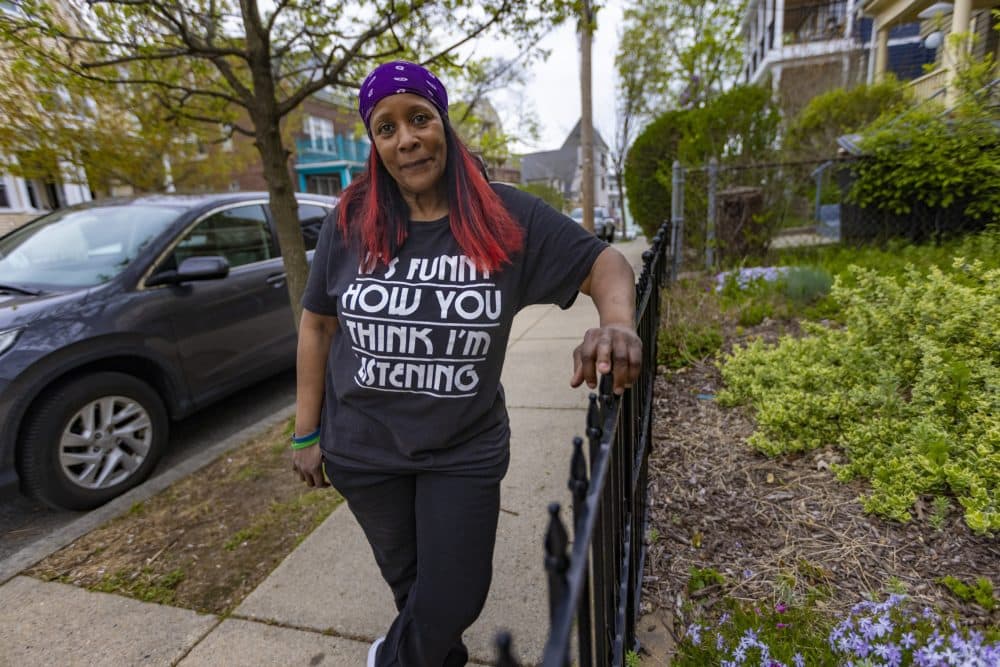
Tracey Williams has been without a home for about half her life. The 60-year-old said she's cycled in and out of housing and homelessness because of substance use disorder, trauma and mental illness.
Last winter, while Williams was staying at Pine Street Inn's women's shelter in Boston, workers asked if she'd like to stay at Charles River Inn in Brighton. Pine Street is running the hotel as temporary shelter in the pandemic.
Williams described the move to her 300-square-foot hotel room as a "step up" from life in a crowded shelter where she had no privacy.
"I think this is an awesome place," Williams said, beaming as she welcomed guests into her room last February. "... It's just me and my roommate. I really believe that it helps with the transition [out of homelessness]."
Williams is one of hundreds of Massachusetts residents experiencing homelessness who stayed in a hotel or motel during the pandemic. For many months, the state funded hotels for people who had mild COVID but didn't have a home where they could isolate. Shelter providers have used motels to reduce crowding and health risks at their main sites.
For Williams and many others, this pandemic-linked effort has been a stabilizing force. Regular meetings at the hotel with case managers from Pine Street Inn and other organizations helped her look for housing and stay connected with services.
Williams said it's a lot easier to address personal challenges when living in a quiet, comfortable space. After moving to the hotel shelter, she said she felt less depressed and more motivated to attend her job training program and methadone treatment.
"I just came in here, and I hit the floor running," Williams said. "School, work — I just did everything I needed to do."
Leaders of this and other hotel-based shelters said it's easier to give clients greater attention when they stay in the same room. At typical shelters, guests are required to leave during the day and may not return. Here, people are regularly around.
Advertisement
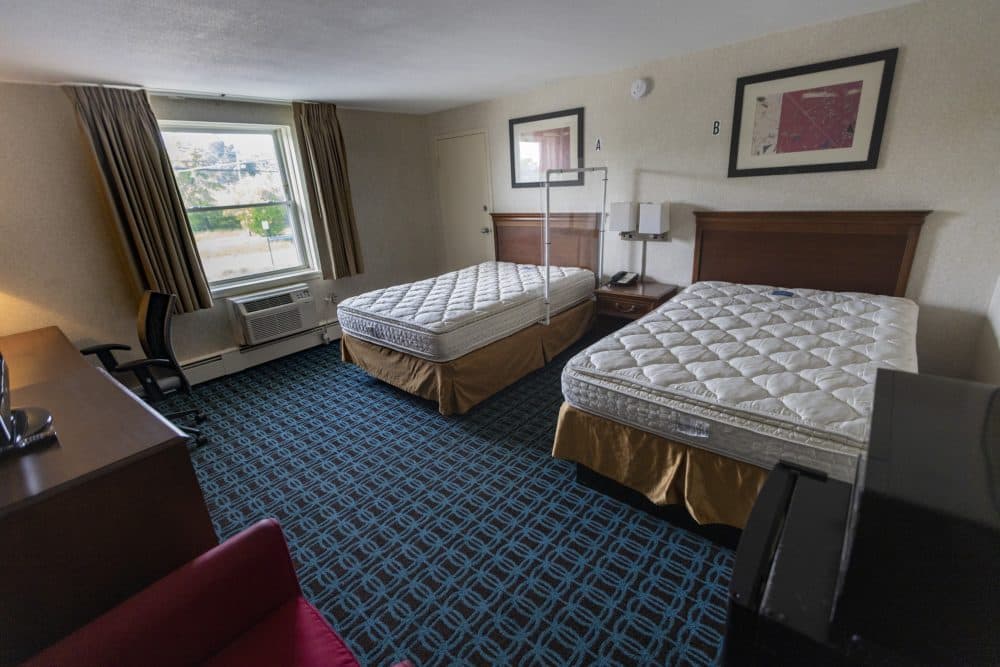
According to the Massachusetts Housing & Shelter Alliance (MHSA), approximately 1,000 hotel and motel beds have been leased as shelter space during the pandemic. The nonprofit advocacy and policy organization said about 600 are still in use, paid for with state and federal funds.
"This is a new piece of strategy that really helped," said Gerry McCafferty, director of housing for the city of Springfield. McCafferty said Springfield hired outreach workers shortly after the pandemic started to ask people living outside if they wanted to stay in a motel or hotel.
People responded, " 'Oh, yeah, that I'll go to. I won't go to a shelter, but that I'll go to, sure,' " she recalled from the outreach workers' accounts.
"I can't think of a single instance where someone said no," McCafferty said. "We found someone in a park here who had been severely mentally ill and had been really off the grid, and had been living outside for 13 years ... never interested in any conversation. [He was] never interested in any services, but the hotel room, he was willing to take. And he's someone who is now moving toward housing."
That's happened over and over again, according to McCafferty. Advocates and leaders in Springfield have found it much easier to bring people into hotel- and motel-based shelters. And, they've seen more success moving people out of those facilities and into permanent housing with supportive services.
City officials examined data over a 22-month period that ended in April and found 46% of people who left local hotel shelters did so to enter permanent housing. By contrast, just 16% of people who stopped staying at the traditional adult homeless shelters in the area left them to enter permanent housing.
Not all providers observed that kind of success, according to leaders at MHSA. But, they said, that's largely due to a tight housing market, made worse by the pandemic causing fewer renters to move.
MHSA said people staying in hotel- and motel-based shelters largely felt safe and comfortable. For some of them, moving to their own apartment seemed daunting or risky given the limited housing options and their fear of future housing instability.
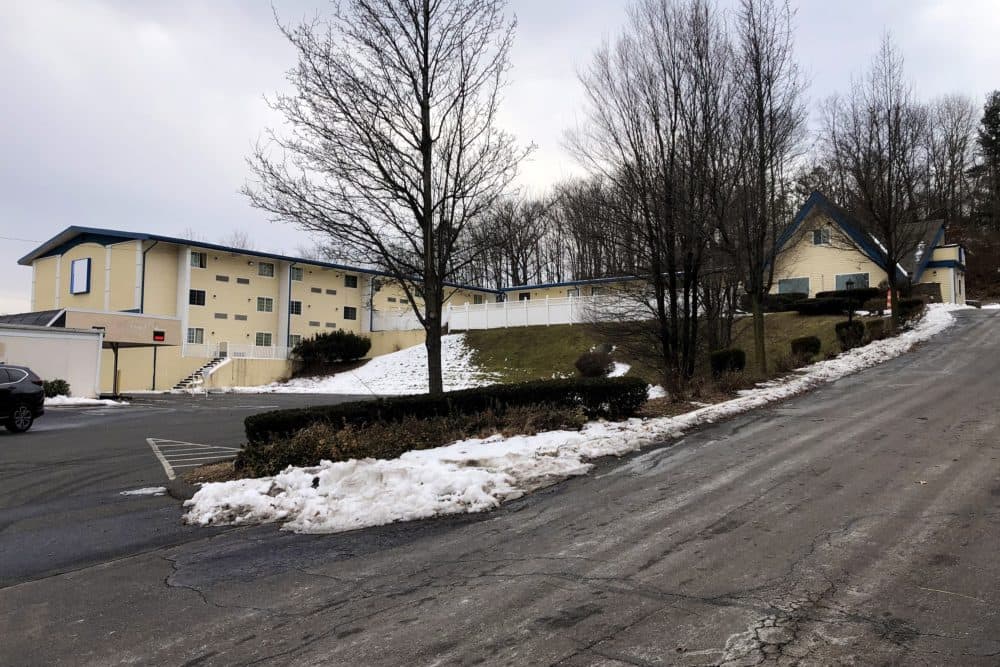
Still, according to MHSA, hotel-based shelters generally provide better conditions to assist people with getting into housing. One of the region's shelters is in Holyoke, where the nonprofit Center for Human Development has leased a former Motel 6.
The organization's senior director of homelessness services, Theresa Nicholson, said the individual-rooming approach to shelter is a critical option for people who struggle in typical group-style, or congregate, shelters.
"Sometimes it's folks that have severe addiction ... or it could be folks that have severe mental illness," Nicholson said.
The agency brings support professionals — including recovery coaches and mental health workers — into the hotel to give clients "an opportunity to talk about their life ... and have an opportunity for change," she said.
People experiencing homelessness who have physical disabilities or chronic health conditions also benefit greatly from non-congregate shelter settings, according to McCafferty.
Guests are told they must leave the properties to use drugs or alcohol. At the former Motel 6 in Holyoke, they have an 11 p.m. curfew, and a staff member has to let them into their rooms. Staffers check on guests every day, and they're given multiple chances to abide by the rules if they struggle, Nicholson said.
But clients aren't under constant supervision, and staff at the motel have administered Narcan twice to reverse overdoses, according to Center for Human Development. Another guest died from an overdose.
As difficult as those situations are, Nicholson said sometimes that "prompts someone else to say, 'I'm ready for help.' "
"Everybody deserves a chance. And everybody deserves to have permanent housing," she said. "And so if this can be their step before getting there, and we can help them become safer and healthier on that journey, then that's what we're here for."
A 'grand pivot'
According to homeless service providers and advocates, leasing hotels, motels, and even college dorms as shelter during the pandemic proved safer and healthier from the start. Rates of COVID-19 infection in shelters dropped, and providers realized they didn't want to return to overcrowded facilities.
"There was kind of this grand pivot to really starting to look at this differently, like ... a sense of not only were we depopulating, now we really shouldn't go back," said Joyce Tavon, senior director of policy and programs at MHSA.
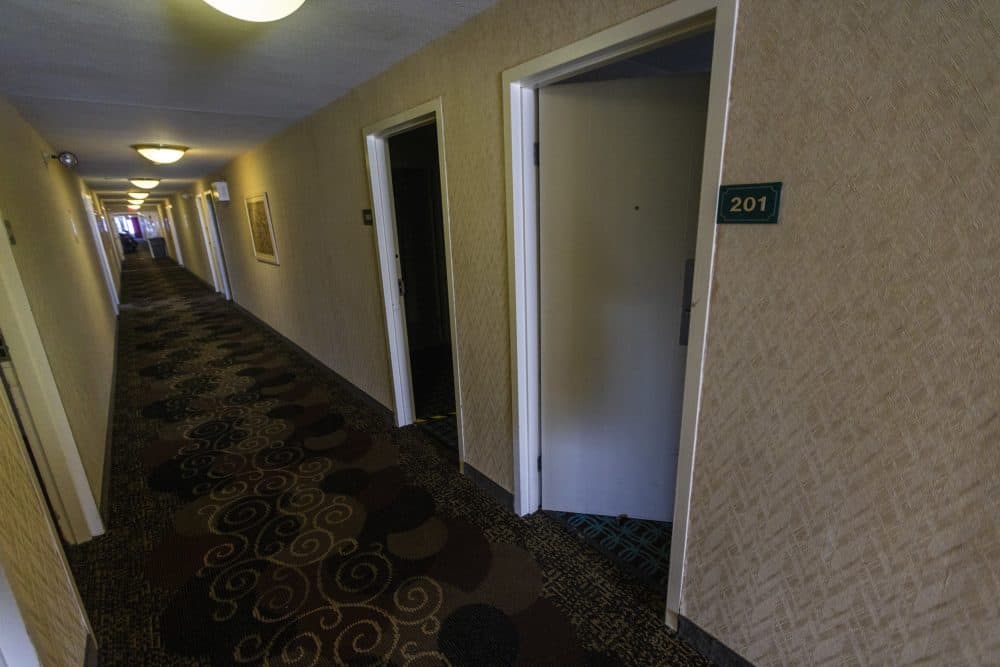
State Rep. Natalie Higgins, of Leominster, wants the non-congregate model to become the standard for homeless shelters in Massachusetts. She said nearly 30% of her office's constituent services cases involve people experiencing homelessness or facing eviction. After seeing the success of a hotel shelter in her district, she sponsored a bill that calls on the state to transition away from congregate homeless shelters within five years.
"My dream is [that] shelter transitions to something that looks a whole lot more like housing," said Higgins. "And our hope is that shelter never becomes a long-term solution — that it is a place to get stabilized. It's a place to get connected with programming."
Higgins would like to see non-congregate shelters in every region of the state, open for guests 24 hours a day, seven days a week. She also wants there to be a universal system for how unaccompanied adults enter nearby shelters. The current patchwork of adult shelters is different from the family homeless shelter program, which is run by the state and has clear steps for families to sign up.
The legislation comes as the state is, for the first time ever, requiring emergency homeless shelters for adults to submit extensive documentation describing their programs in order to receive state funds.
"My dream is [that] shelter transitions to something that looks a whole lot more like housing ... And our hope is that shelter never becomes a long-term solution — that it is a place to get stabilized."
State Rep. Natalie Higgins
There's resistance to Higgins' bill from some shelter leaders. They say they're concerned they could be forced to remodel or rebuild, without proper funding or an overall plan from the state.
"Do I think it's a terrific goal? Do I think we could get there? Yeah, but you can't just get there with legislation, with no funding and no roadmap," said Lyndia Downie, president and executive director of Pine Street Inn. "You've got to have a plan. ... You've got to be able to execute on it. And I'm not seeing any plan or any funding that's going to get us there at the moment."
A focus on housing
The bill also calls on the state to scale up permanent housing for vulnerable populations. Many advocates say that's where energy and funding should be focused.
"If you can get a hotel or if you can get a building, it should be all about housing," said John Yazwinski, president and CEO of Father Bill's & MainSpring.
The nonprofit runs emergency homeless shelters and permanent housing programs on the South Shore. Early in the pandemic, it rented a struggling hotel in Brockton for some of its shelter guests. It then went a step further; it purchased the hotel to convert it to 69 units of permanent supportive housing. It's the first time a homeless service provider in Massachusetts has done that.
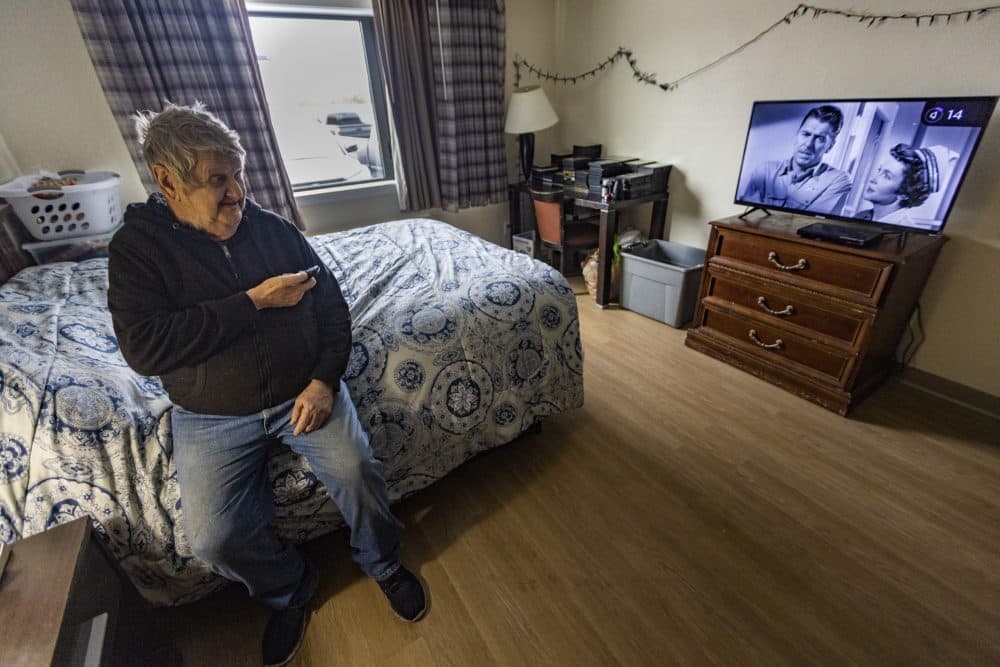
So far, 17 people have moved in as tenants, including 73-year-old Ray Allen Gaessler.
One day this past winter, Gaessler sat inside his studio apartment, doing one of his favorite activities: watching an old movie. He proudly showed off his large collection of DVDs and the TV he recently bought for himself, along with his kitchenette stocked with everything from spices to frozen meats.
Gaessler explained he became homeless several years ago when his marriage failed. Injuries from an accident kept him from working. Now, he's just happy to have a small space he can call home.
"You get to clean it, you get to cook your own food and decide when you want to go to bed and when you don't," Gaessler said. Asked if he really likes to clean it, he responded, "That's part of the good part."
"If you can get a hotel or if you can get a building, it should be all about housing."
John Yazwinski, president & CEO, Father Bill's & MainSpring
Father Bill's & MainSpring is able to convert the hotel for about half of what it normally costs to develop affordable housing, since the bones of the rooms and bathrooms were already there. It's about $150,000 per unit, with a total project cost of just over $10 million — mostly paid for with state dollars, along with some private grants, according to Yazwinski.
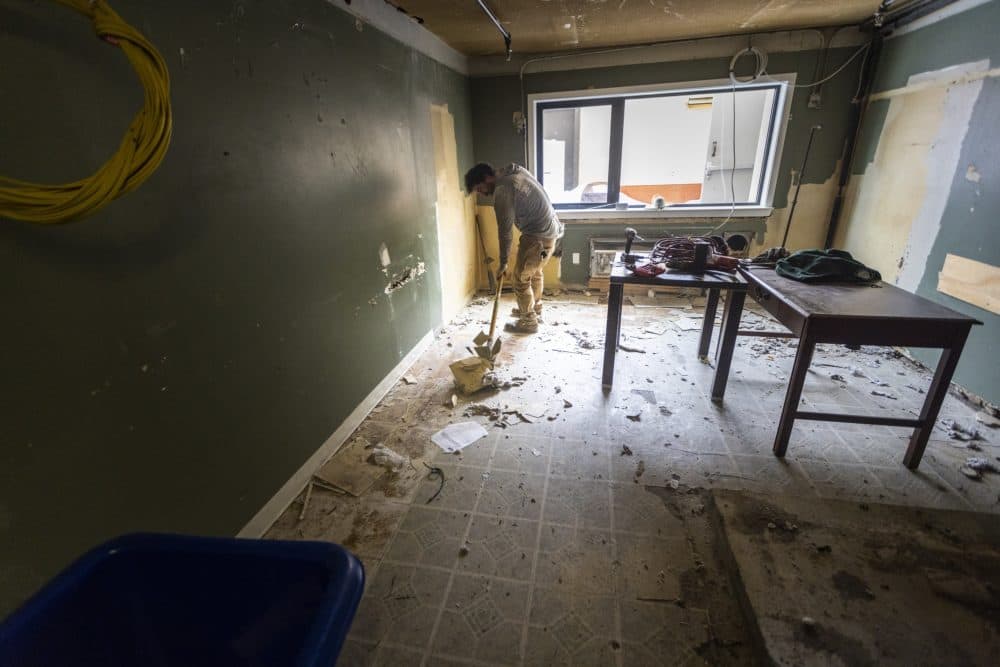
The whole thing happened in record time for the organization, he said; it helped that the nonprofit had deep experience both developing and operating housing properties. This is its biggest to date. And the local community supported the project. Smaller homeless service organizations often run into resistance and financial roadblocks, including market competition for potential properties. Yazwinski said he hopes that will change — and that this moment won't be lost.
"We don't want hotels to go out of business. But ... if it's going to be a place that sits, you know, or struggles, then let's look at it as a great opportunity," he said. "It's time to end homelessness. Let's all get the political will needed at the local, state and federal level to do it now."
According to The Massachusetts Lodging Association, a very small percentage of hotels and motels in the state have gone out of business or up for sale during the pandemic. It doesn't collect data on hotel closings.
Meanwhile, there's a pool of money that could give Massachusetts a big boost when it comes to the development of permanent supportive housing. The state dedicated $150 million in federal pandemic relief funds from the American Rescue Plan Act for that purpose. Advocates are working to develop a plan to get the most out of the money.
As for Tracey Williams, she's taken another step toward permanent housing. She's moved into her own room, in an apartment with others who were previously sheltered at Pine Street Inn. She said she has a lease and can stay there for up to a year, as she builds a new tenancy history and works with case managers to find a place of her own.
